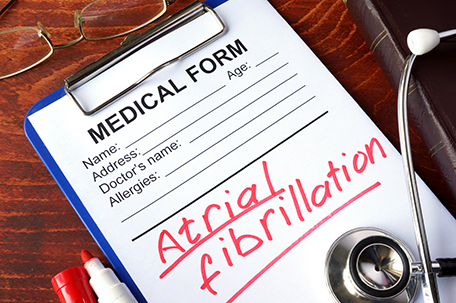
BPT
For some, simple activities that others often take for granted – like walking around the neighborhood or doing chores around the house – can make them feel tired or dizzy. They may feel their heart racing or like a hummingbird is flapping its wings in their chest.
These symptoms may point to atrial fibrillation, or Afib.
Affecting nearly 3 million Americans, Afib is the most common heart rhythm disorder, causing a quivering or irregular heartbeat. Without treatment, Afib can double the risk of heart-related deaths and increase the risk of stroke by five times. It is estimated to be responsible for more than 80,000 deaths each year, but it doesn’t need to be left untreated.
“Many of my patients are unaware that Afib is a serious condition and don’t know how to manage it,” says Dr. Larry A. Chinitz, Professor of Medicine and Cardiac Electrophysiology and Clinical Director of the Leon Charney Division of Cardiology at the New York University School of Medicine. “The sooner that people learn about Afib and receive treatment, the greater the chance of stopping the condition before it leads to more serious complications. That’s why diagnosing Afib and getting the proper treatment is imperative.”
An online survey by Harris Poll on behalf of Biosense Webster, Inc. of more than 200 U.S. adults who had been diagnosed with Afib found that 63 percent of people surveyed felt they were extremely knowledgeable about their treatment options. However, when asked specifically, many were not familiar with all of the different types of available treatments.
While several effective options for treating Afib do exist, people frequently aren’t fully equipped to make informed health decisions. This gap between perceived knowledge and actual understanding of specific treatments is what many doctors specializing in heart rhythm disorders, including cardiologists and electrophysiologists, are trying to close.
Treatment options
The most appropriate treatment often depends on the type of Afib, how long someone has had the condition, severity of symptoms and the underlying cause. Generally, treatment goals include reducing the risk of complications including stroke and restoring a normal heart rhythm.
One treatment option, which only half of surveyed Afib patients were familiar with, is known as cardiac/catheter ablation. This minimally-invasive therapy provides an alternative for those who don’t respond to, or can’t tolerate, drug therapy.
Catheter ablation selectively targets areas of the heart causing heart rhythm irregularities. During the procedure, doctors insert a catheter through a small incision in the groin, where it is then guided to the heart through a blood vessel. Once it reaches the left upper chamber of the heart (atrium), radiofrequency energy is delivered to the heart wall to block faulty electrical impulses that can cause heart rhythm disorders.
This type of treatment is helping doctors more accurately target areas of the heart. Now, with products like the THERMOCOOL SMARTTOUCH SF Catheter with contact force technology, electrophysiologists are able to precisely measure the amount and direction of force being applied to a delicate heart wall.
These technological advances have led to improved results and shorter procedure times for patients, without compromising safety. A multicenter, prospective study of the THERMOCOOL SMARTTOUCH technology demonstrated a success rate of greater than 74 percent after a one-year follow-up. In the study, success was defined as freedom from abnormal heart rhythm for 12 months.
Raising awareness
Afib is a progressive disease, and over time, repeated incidents can lead to issues including irreversible heart rhythm abnormalities, blood clots, chronic fatigue, stroke and heart failure. For people with this condition, knowledge can quickly translate to better health. Oftentimes, simply the lack of information may prevent them from taking the first steps to a healthier life.
Talk to a local doctor who specializes in heart rhythm disorders or visit www.GetSMARTAboutAfib.com to learn more about how to identify and manage this condition. The sooner you’re able to learn about available treatment options, the sooner you or your loved one can get back to leading a healthy, fulfilling life.
As with any medical treatment, individual results may vary. Only a cardiologist or electrophysiologist can determine whether ablation is an appropriate course of treatment. There are potential risks including bleeding, swelling or bruising at the catheter insertion site, and infection. More serious complications are rare, which can include damage to the heart or blood vessels; blood clots (which may lead to stroke); heart attack; or death, are rare. These risks need to be discussed with your doctor, and recovery takes time.
















Leave a Comment